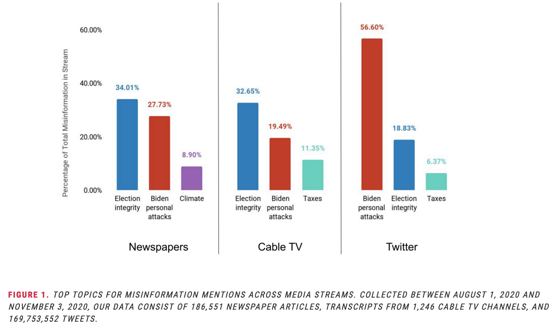“Research Note: Lies and Presidential Debates: How Political Misinformation Spread Across Media Streams During the 2020 Election”
Title
Authors
Jaren Haber
Georgetown University
Lisa Singh
Georgetown University
Ceren Budak
University of Michigan
Josh Pasek
University of Michigan
Meena Balan
Georgetown University
Ryan Callahan
Georgetown University
Rob Churchill
Georgetown University
Brandon Herren
Georgetown University
Kornraphop Kawintiranon
Georgetown University
Source
Harvard Kennedy School (HKS) Misinformation Review
DOI: 10.37016/mr-2020-84
From the Article
When U.S. presidential candidates misrepresent the facts, their claims get discussed across media streams, creating a lasting public impression. We show this through a public performance: the 2020 presidential debates. For every five newspaper articles related to the presidential candidates, President Donald J. Trump and Joseph R. Biden Jr., there was one mention of a misinformation-related topic advanced during the debates. Personal attacks on Biden and election integrity were the most prevalent topics across social media, newspapers, and TV. These two topics also surfaced regularly in voters’ recollections of the candidates, suggesting their impression lasted through the presidential election.
Research Questions
- What false and misleading statements mentioned during either debate gained traction during the campaign season?
- How was misinformation from the debates reflected across modes of communication? On what media streams did discussion of these claims grow?
- What topics from the debates made an impression on the public? What key features distinguished these from topics that did not become salient?
Essay Summary
- We studied how the 2020 U.S. presidential debates reinforced misinformation themes, which spread through multiple media streams: social media, newspapers, and cable TV.
- We analyzed 14 misinformation-related topics advanced by the presidential nominees during the September 29 and October 22 debates, comparing how these topics were discussed across media and were recalled by the general public in open-ended surveys.
- The misinformation-related topics that garnered the most media attention and had highest levels of recall by ordinary Americans were personal attacks on Joe Biden and election integrity. Newspapers and TV were the most highly correlated sources in terms of misinformation-related coverage.
- Following the first debate, Twitter conversations about the candidates focused on personal attacks on the Biden family. Election integrity was discussed more consistently but also grew across media around the debates.
- Misinformation-related topics mentioned in the debates that received moderate media attention, such as taxes, climate, and racism, were recalled far less often by ordinary Americans. This suggests that both political mentions and media attention are necessary but insufficient conditions for misinformation-related topics to “stick” in public memory.
- We suggest that discussion of false claims in the media—whether supporting or refuting them—facilitates the diffusion and acceptance of misinformation, enabling political elites to distort the truth for partisan gain.
Direct to Full Text Article
Filed under: News
About Gary Price
Gary Price (gprice@gmail.com) is a librarian, writer, consultant, and frequent conference speaker based in the Washington D.C. metro area. He earned his MLIS degree from Wayne State University in Detroit. Price has won several awards including the SLA Innovations in Technology Award and Alumnus of the Year from the Wayne St. University Library and Information Science Program. From 2006-2009 he was Director of Online Information Services at Ask.com.



